We wanted to experience those spectacular, deep gorges before they were filled with water and silt, but, she explained, we had to travel with an approved tour company working under the Chinese system—much as we had in the Soviet Union. This, we discovered, would lead to some much-too-interesting experiences.
Flying in China in 1993 was not just an adventure; it was a pinball game with death, a comic book version of Ingmar Bergman's chess game with the Grim Reaper. All of the interior walls of our ancient China Air 747 (it once had belonged to Aeroflot) had been removed so that we could see the lack of service from one end of the plane to the other.
We're going to have to be flexible," Sherrill whispered.
This turned out to be the monarch of understatements.
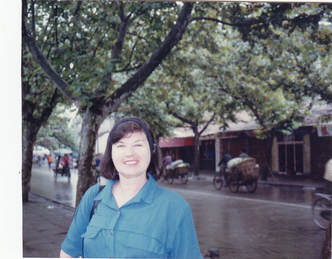 Sherrill: China street scene with pedicabs
Sherrill: China street scene with pedicabs Private businesses, we were told, had just become possible in China.
"Doesn't that go against communist-socialist beliefs?" I asked.
"No. Like Chairman Deng say, no matter cat black or white if catch rat."
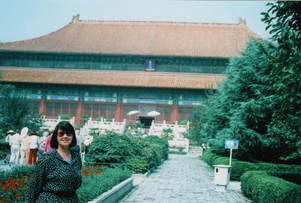 Sherrill, Hall of Heavenly Favor, Ming Tombs
Sherrill, Hall of Heavenly Favor, Ming Tombs Surprisingly, he was very open about his life. His father had been an engineer until the Cultural Revolution, when he was sent to do manual labor on a farm, plummeting his family from prosperity into poverty. However, as a small child Rick was selected because of his body type for the state's special athletic school.
"I was happy that because of me my family now had better life. Swimming and table tennis were my sports. World championship my goal. I worked at them thirteen hours a day, but was miserable because I was growing up uneducated. Finally, when fourteen I quit that school and went to Language Academy to learn English, but then I have to serve state as tour guide."
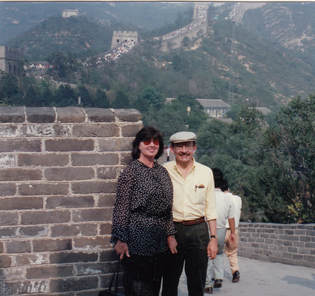 Sherrill & Bruce on Great Wall
Sherrill & Bruce on Great Wall 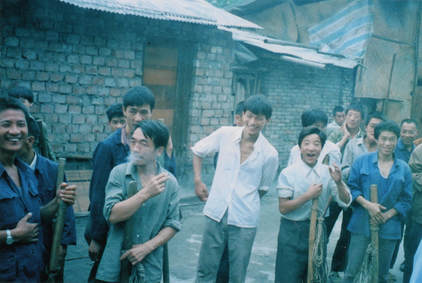 Young porters eager to carry bags to ship, Chongquing
Young porters eager to carry bags to ship, Chongquing 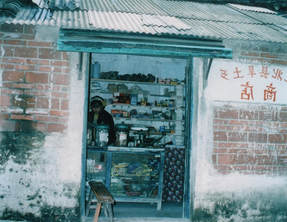 Mountain village herb shop
Mountain village herb shop "But did we want to?" countered another passenger.
The detour was turning into more of an adventure than most of the passengers wanted. Wandering over the mountains, we were losing time on the ship, and people were worrying that we wouldn't reach it by dark. Did the drivers know where they were going? The dirt road was twisty and often steep, not built to accommodate large tourist coaches. From time to time, we passed farmers or children on the road, as well as carts, small trucks, and tiny tractors, and once a battered mini-bus. Occasionally, we skidded in the dirt, sliding sideways before moving forward.
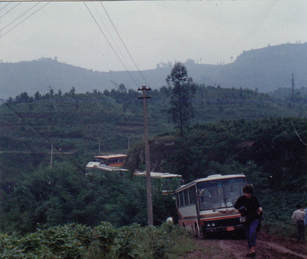 The five buses on the mountain detour
The five buses on the mountain detour Then muddy pockets opened up in the road, which the busses churned through, roaring up and out of them as quickly as possible, but they came more and more often as the road became narrower and steeper and the buses slid and maneuvered more. A storm the day before had washed away parts of the cliff, possibly sections of road. Finally, as the sky darkened, we spied a wedge of greenish-gray water in the distance, between two mountainsides: the river—the end of this impromptu and frightening journey—but it vanished again.
Then we came to an abrupt stop.
Something had happened in front of us. Rick jumped out of our bus and ran to the coach ahead. On a narrow curve, trying to pass a small tractor pulling a load of rocks through deep muddy tracks, the second bus had lost momentum and slipped in the mud until its right rear wheel was hanging over the cliff edge. Rocks were placed under the other three wheels and the hysterical passengers—a group of Canadian Chinese—got off the bus.
Rick told us that the ship was only a mile or so away, mostly downhill. Some passengers from the other buses were striking out, carrying their hand luggage, to walk to the ship. Local farmers would be hired as porters to carry bags for anyone who couldn't carry his own.
"All the larger bags are already on the ship."
"Wanna bet?" one of the passengers countered.
"Ship?" said somebody else. "You think there's a ship down there?"
So, four busloads of tourists from around the world began trudging through the slippery mud on the cliff-side road. Then, moments after everybody had started hiking: rain.
Sherrill pulled her folding umbrella and rain hat out of her purse, I rolled up my trouser cuffs, and we continued the trek along the rain and mud-filled tracks. Sherrill loaned the rain hat to an eighty-one year-old woman we'd got to know. Rick trotted up and down among us, grinning and joking, apparently trying to keep up our spirits.
"All will be okay! Be happy!"
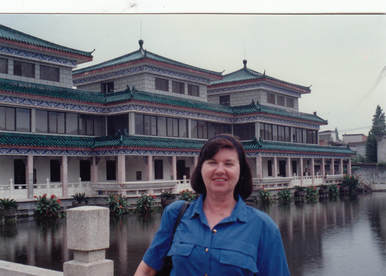 Sherrill, Jingzhou Museum
Sherrill, Jingzhou Museum "Welcome," we were greeted by several young hostesses in burgundy velvet dresses slit to the thigh as they passed out wet washcloths to us, and we maneuvered through the lobby crowded with luggage to get our room keys. The moment everyone was on board, the ship's engines jerked into action, trying to make up for lost time.
In addition to everything else, this ship wasn't the one we were scheduled to be on. That ship, the new Yangtze Princess, had been commandeered by the Chinese government for a group of VIPs, so five bus loads of less important tourists were put on this boat. That ship probably would have made it upriver to Chongqing. We soon discovered that the White Emperor crew wasn't used to western tourists. Few of them spoke English or other European languages.
"We're on the Yangtze!" Sherrill exclaimed, giving me a nudge. "Be happy!"
To be continued....
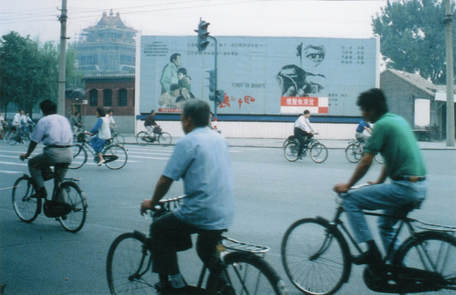
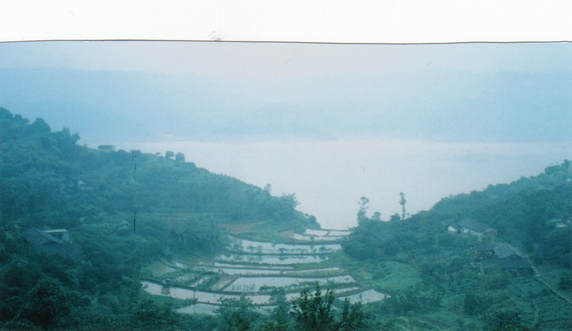
 RSS Feed
RSS Feed